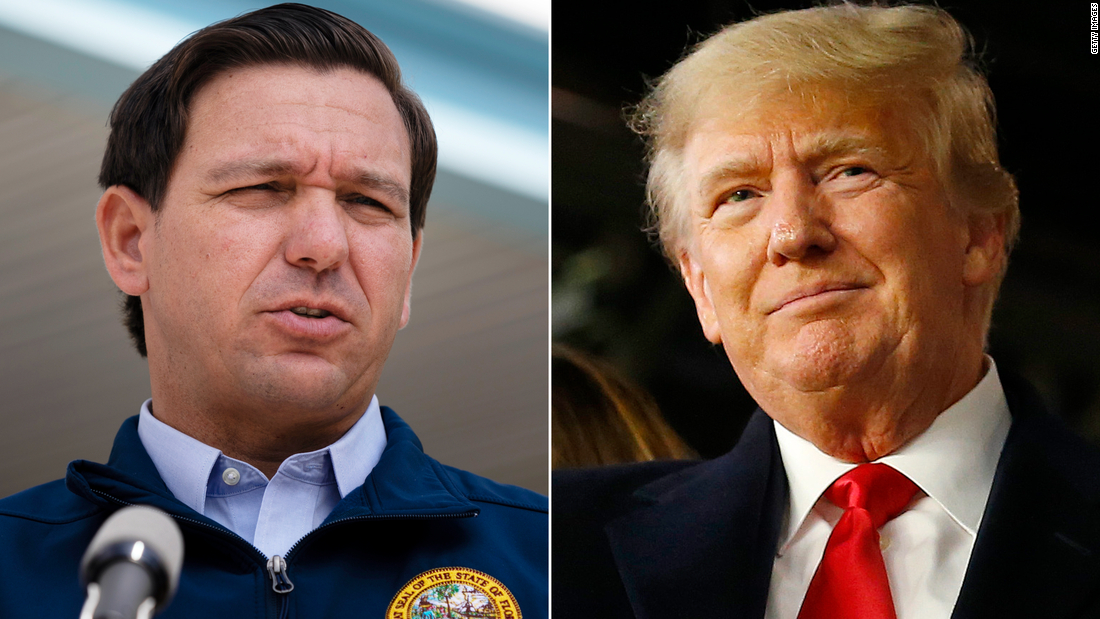While Trump continues his personal quest for vengeance, DeSantis is sending electric political charge through the GOP base
But successful candidates position themselves well ahead of time to take advantage of future openings. All a potential GOP presidential hopeful can do now is prepare for a post-Trump era, if it happens. And DeSantis is using his flair for leveraging his official role as governor and his reelection race to pick fights on issues that matter to Trump voters, to saturate conservative media and to emerge as the dominant potential 2024 Republican not named Trump. If the ex-President stumbles, decides not to run or becomes embroiled in his own legal troubles, DeSantis is already presenting himself as an alternative. And in some ways, their shadow boxing is offering the first sign of a fork in the road for the Republican Party.
With Trump, activists can get a relitigation of an election that would then be four years in the past and the promise to use a second term to wreak havoc on the political, legal and foreign policy elites that thwarted him in his first term. There are few signs of new policies or approaches that might look to the future.
Trump retains fierce support in the heartland — the number of signs bearing his name alongside major highways and homes remains remarkable testimony to the connection forged by the former President. But it’s not a given that all of those voters, while still viewing Trump with affection, will necessarily want to see him mount a third presidential bid. An NBC poll last month for, instance, showed that there are now more Republicans who consider themselves GOP voters than Trump voters — in a steady decline in the former President’s standing.
At the head of the pack
DeSantis has maneuvered himself into a solid political position. If he judges that Trump is too strong to oppose in the 2024 primary, he has the luxury of a gubernatorial term that will run through 2026, assuming he wins what is looking like a manageable reelection in November. That would allow him a plausible excuse to skip a race if Trump is in the field, and to play the long game ahead of a possible White House run in 2028 or later.
New clashes with Biden
DeSantis forced himself into the national political conversation again in recent days with his latest assault on Fauci, the government’s top infectious diseases specialist who has become an avatar for conservative fury over government pandemic guidelines.
The governor is selling flip flops on his campaign website that bear the slogan “Fauci Can Pound Sand” on the soles. The eye-catching stunt is his latest shot at an internationally respected expert who has battled Covid-19 in the Trump and Biden administrations and fought epidemics worldwide since taking the helm of the National Institute of Allergy and Infectious Diseases during the Reagan administration. Previously, DeSantis condemned “Faucism” and accused the veteran official of covering up for China on the origins of the pandemic.
The Florida governor is also making a name for himself on an issue guaranteed to fire up GOP voters — immigration.
The children, who arrived at the US-Mexico border alone, are in government custody and remain in shelters until they can be reunited with a vetted sponsor, like a parent or relative, in the United States. But in a letter sent to the Health and Human Services Department last week, and obtained by CNN, Florida’s general counsel alleged the federal government was participating in a “human trafficking scheme.”
His swift pivot — from defense to an attack that nailed a culture war angle and referenced one of the conservative movement’s favorite targets — was purely Trumpian. And it’s once reason why DeSantis is getting so much notice as thoughts turn to the next GOP presidential race.
![]()


